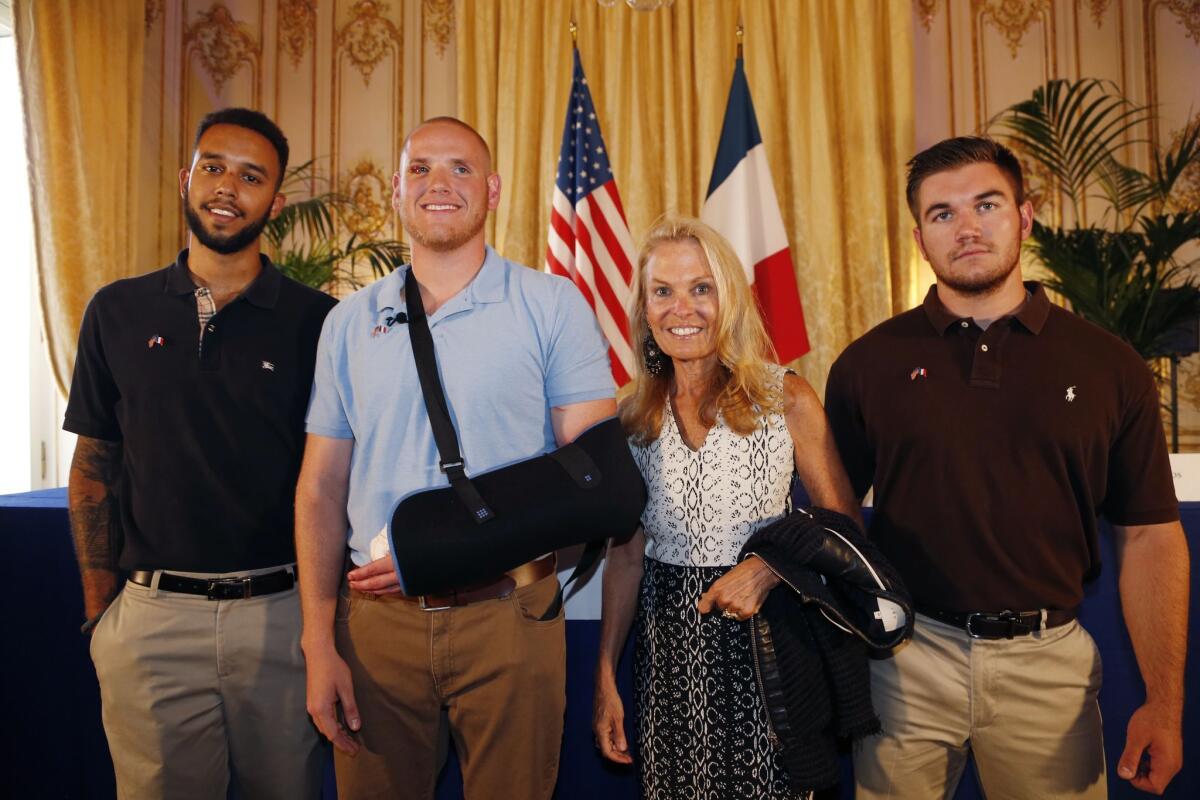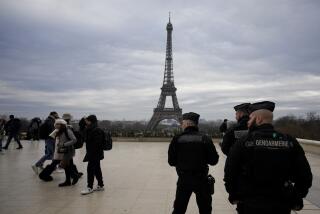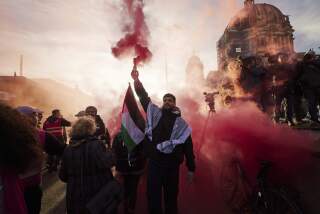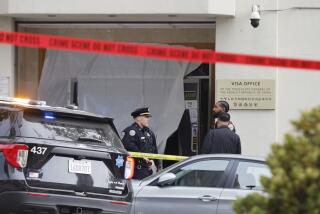Americans recount French train attack: ‘He was ready to fight to the end. So were we.’

From left, Cal State Sacramento student Anthony Sadler, U.S. serviceman Spencer Stone, U.S. ambassador to France Jane Hartley and National Guardsman Alek Skarlatos pose after a news conference at the U.S. Embassy in Paris on Sunday.
“He seemed like he was ready to fight to the end. So were we.”
Spencer Stone, the U.S. serviceman who was the first American to tackle a gunman aboard a Paris-bound train, spoke to reporters for the first time Sunday and described a fierce struggle that neutralized the attacker but left Stone with injuries requiring surgery, including a nearly severed thumb.
------------
For the record
An earlier version of this article described Istanbul as the Turkish capital. The capital of Turkey is Ankara.
------------
After being awakened by the sound of a gunshot in their railway carriage Friday afternoon, Stone and his friends, Alek Skarlatos and Anthony Sadler, looked up and saw an assailant at the end of the car holding an AK-47.
“It looked like it was jammed or it wasn’t working, and he was trying to charge the weapon,” Stone, a U.S. airman from Carmichael, Calif., told reporters gathered at the U.S. embassy in Paris. “Alek just hit me on the shoulder and said, ‘Let’s go.’”
The two childhood friends, with Sadler not far behind, ran down the length of the carriage and tackled the shirtless gunman. Stone locked him in a chokehold while Skarlatos snatched his gun away.
“It seemed like he kept pulling more weapons left and right – pulled out a handgun, Alek took that; took out a box cutter, started jabbing at me with that. We let go,” said Stone. “All three of us started punching him while he was in the middle of us. I was able to grab him again and choke him unconscious while Alek was hitting him in the head with the pistol or rifle….
“He seemed like he was ready to fight to the end. So were we.”
With the help of a British businessman, the Americans hogtied the attacker with a necktie. But Stone, trained as a paramedic, noticed a nearby passenger who had apparently been hit by a bullet and was bleeding profusely from the neck.
Ignoring his own injuries, including the slashed thumb, Stone found the wound and stanched the flow.
“I just stuck two of my fingers in the hole, found what I thought to be the artery, pushed down and the bleeding stopped, and so I just said, ‘Thank God,’” he said.
The three friends have been hailed as heroes by both President Obama, who telephoned them Saturday, and by French President Francois Hollande.
But they struck a humble note at Sunday’s news conference, thanking the French authorities who cared for them after the attack and also crediting a Frenchman who apparently was the first person to confront the assailant when the gunman emerged from a washroom.
“I feel like he deserves a lot of the credit because if it wasn’t for him, maybe it could’ve been way different,” Stone said.
The suspect has been identified as 25-year-old Ayoub El Khazzani, a Moroccan national who French authorities say has had ties with terrorist organizations. A lawyer who was with El Khazzani after his arrest said he denies any terrorist intentions and insists that he was planning to rob the passengers.
“He is dumbfounded that his action has taken on a terrorist dimension,” Sophie David told French television channel BFMTV. “He doesn’t understand why this story has taken on such importance. He took weapons and boarded the train to basically extort money from the passengers.”
But Sadler, a student at Cal State Sacramento, scoffed at that idea.
“It doesn’t take eight magazines to rob a train,” he said of the ammunition found on the suspect.
Besides their own quick actions, the Americans credited luck with having prevented a potential bloodbath. After his weapon jammed, the gunman appeared not to know how to get it to work.
“He clearly had no firearms training whatsoever,” Skarlatos said. “If he knew what was he doing, or even just got lucky and did the right thing, he would’ve been able to operate through all eight of those magazines, and we would’ve all been in trouble and probably wouldn’t be here today, along with a lot of other people.”
David, the lawyer, said her former client said the gun jammed and that he did not fire a single shot.
“When I told him people had been injured, he almost fell off his chair. As far as he was concerned, there were no shots fired. The Kalashnikov didn’t work,” David said on Sunday.
David described the arrested man as “very thin ... very haggard” and said he understood only a few words of French, answering questions in Arabic instead through an interpreter. He claimed to have found the AK-47 in a suitcase in a Brussels park near the station where he boarded the train.
She was El Khazzani’s lawyer during his first interrogation in Arras, the northern French town where he was arrested. She is no longer representing him since he was moved for questioning to France’s anti-terrorist headquarters on the outskirts of Paris.
French Interior Minister Bernard Cazeneuve said Saturday that El Khazzani’s name appeared on security alert lists in three countries — Belgium, France and Spain — because of his alleged links to radical Islamic organizations. French media reported that, after being alerted by their Spanish counterparts, French authorities classified El Khazzani as a Grade 3 security threat in France, on a 16-point scale where 1 is most dangerous and 16 the least.
German intelligence services say El Khazzani appeared on their radar in May this year when he took a plane from Berlin to Istanbul, Turkey. Most jihadis traveling to join Islamic State in Syria travel through Turkey. Spanish security services also insist that El Khazzani returned from Syria to France, but there appear to be discrepancies between the French and Spanish intelligence services’ accounts of his movements.
David said the suspect disputed that account. “He denies having gone to Turkey or Syria and says he traveled around Spain, Andorra, Belgium, Austria and Germany during the last six months, as well as one visit to France.” Convicted twice for drug trafficking in Spain in 2013, El Khazzani has told police he worked as a painter and decorator in Spain, David added.
At the U.S. Embassy news conference, the three Americans said they had been napping when the gunman appeared. “The guy had a lot of ammo and his intentions were pretty clear,” Skarlatos said.
Stone added he had not thought twice about confronting the gunman. “In the beginning it was gut instinct, survival. It wasn’t a conscious decision. There wasn’t much thinking going on my end, anyway…. Our aim was to survive … and for everyone else on that train to make it.”
Stone underwent surgery to have his thumb reattached and was released from the hospital Saturday evening.
The trio’s adventures are not over yet: On Monday, Hollande will receive and recognize them at the Elysee Palace.
“I’m still waiting to wake up,” Sadler said. “This all just seems like a movie scene or something.”
He said he hoped others would draw a lesson from what happened.
“Hiding or sitting back is not going to accomplish anything, and the gunman would’ve been successful if my friend Spencer had not gotten up,” Sadler said. “So I just want that lesson to be learned going forward, in times of terror like that, to please do something. Don’t just stand by and watch.”
Special correspondent Willsher reported from Paris and Times staff writer Chu from London
ALSO:
State’s electric vehicle program is blasted as a giveaway to the rich
Democrats defend Hillary Clinton’s use of private email server
Israel is abuzz over reports that attacks on Iran were planned but abandoned
More to Read
Start your day right
Sign up for Essential California for news, features and recommendations from the L.A. Times and beyond in your inbox six days a week.
You may occasionally receive promotional content from the Los Angeles Times.







